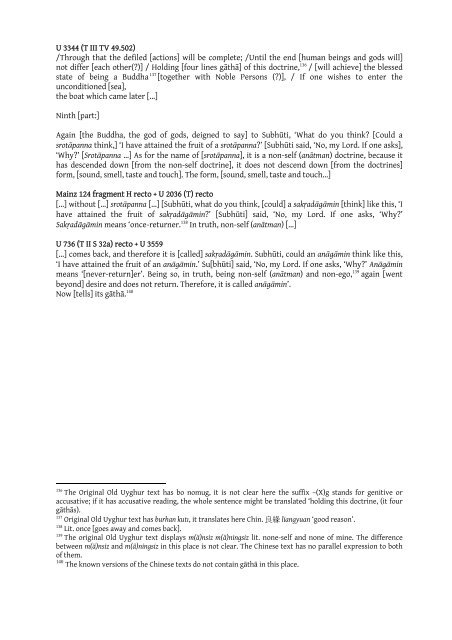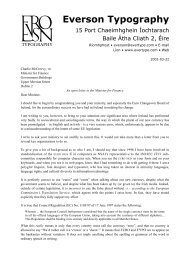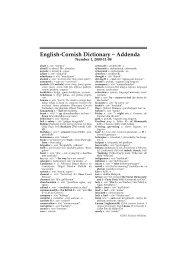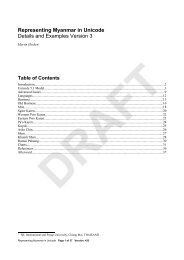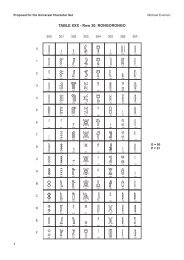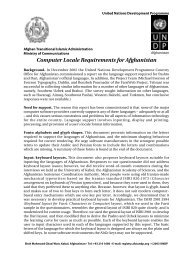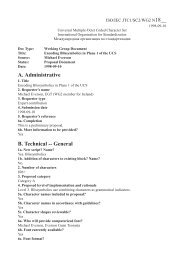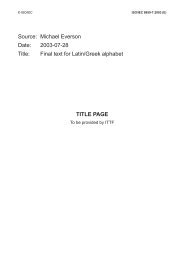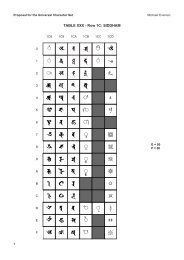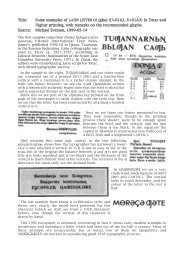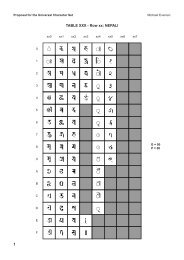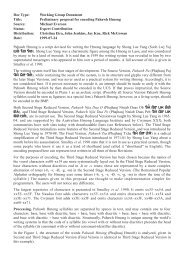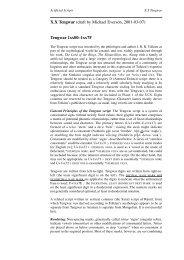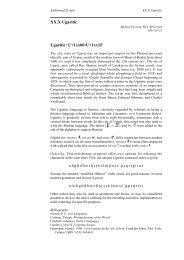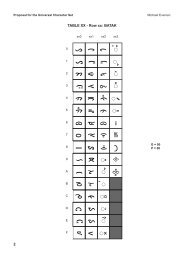The Vajracchedikā-sūtra with gāthās compiled by Master Fu - Evertype
The Vajracchedikā-sūtra with gāthās compiled by Master Fu - Evertype
The Vajracchedikā-sūtra with gāthās compiled by Master Fu - Evertype
Create successful ePaper yourself
Turn your PDF publications into a flip-book with our unique Google optimized e-Paper software.
U 3344 (T III TV 49.502)<br />
/Through that the defiled [actions] will be complete; /Until the end [human beings and gods will]<br />
not differ [each other(?)] / Holding [four lines gāthā] of this doctrine, 136 / [will achieve] the blessed<br />
state of being a Buddha 137 [together <strong>with</strong> Noble Persons (?)], / If one wishes to enter the<br />
unconditioned [sea],<br />
the boat which came later […]<br />
Ninth [part:]<br />
Again [the Buddha, the god of gods, deigned to say] to Subhūti, ‘What do you think? [Could a<br />
srotāpanna think,] ‘I have attained the fruit of a srotāpanna?’ [Subhūti said, ‘No, my Lord. If one asks],<br />
‘Why?’ [Srotāpanna …] As for the name of [srotāpanna], it is a non-self (anātman) doctrine, because it<br />
has descended down [from the non-self doctrine], it does not descend down [from the doctrines]<br />
form, [sound, smell, taste and touch]. <strong>The</strong> form, [sound, smell, taste and touch…]<br />
Mainz 124 fragment H recto + U 2036 (T) recto<br />
[…] <strong>with</strong>out […] srotāpanna […] [Subhūti, what do you think, [could] a sakṛadāgāmin [think] like this, ‘I<br />
have attained the fruit of sakṛadāgāmin?’ [Subhūti] said, ‘No, my Lord. If one asks, ‘Why?’<br />
Sakṛadāgāmin means ‘once-returner. 138 In truth, non-self (anātman) […]<br />
U 736 (T II S 32a) recto + U 3559<br />
[…] comes back, and therefore it is [called] sakṛadāgāmin. Subhūti, could an anāgāmin think like this,<br />
‘I have attained the fruit of an anāgāmin.’ Su[bhūti] said, ‘No, my Lord. If one asks, ‘Why?’ Anāgāmin<br />
means ‘[never-return]er’. Being so, in truth, being non-self (anātman) and non-ego, 139 again [went<br />
beyond] desire and does not return. <strong>The</strong>refore, it is called anāgāmin’.<br />
Now [tells] its gāthā. 140<br />
136<br />
<strong>The</strong> Original Old Uyghur text has bo nomug, it is not clear here the suffix –(X)g stands for genitive or<br />
accusative; if it has accusative reading, the whole sentence might be translated ‘holding this doctrine, (it four<br />
<strong>gāthās</strong>).<br />
137 Original Old Uyghur text has burhan kutı, it translates here Chin. 良 緣 liangyuan ‘good reason’.<br />
138<br />
Lit. once [goes away and comes back].<br />
139 <strong>The</strong> original Old Uyghur text displays m(ä)nsiz m(ä)ningsiz lit. none-self and none of mine. <strong>The</strong> difference<br />
between m(ä)nsiz and m(ä)ningsiz in this place is not clear. <strong>The</strong> Chinese text has no parallel expression to both<br />
of them.<br />
140 <strong>The</strong> known versions of the Chinese texts do not contain gāthā in this place.


